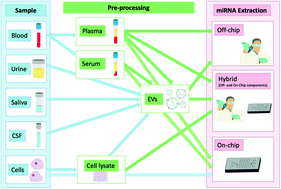On-chip miRNA extraction platforms: recent technological advances and implications for next generation point-of-care nucleic acid tests
Abstract
Circulating microRNAs (or miRNAs) in bodily fluids, are increasingly being highlighted as promising diagnostic and predictive biomarkers for a broad range of pathologies. Although nucleic acid sensors have been developed that can detect minute concentrations of biomarkers with high sensitivity and sequence specificity, their robustness is often compromised by sample collection and processing prior to analysis. Such steps either (i) involve complex, multi-step procedures and toxic chemicals unsuitable for incorporation into portable devices or (ii) are inefficient and non-standardised therefore affecting the reliability/reproducibility of the test. The development of point-of-care nucleic acid tests based on the detection of miRNAs is therefore highly dependent on the development of an automated, on-chip, sample processing platform that would enable extraction or pre-purification of the biological specimen prior to reaching the sensing platform. In this review we categorise and critically discuss the most promising technologies that have been developed to facilitate the transition of nucleic acid tests based on miRNA detection from bench to bedside.

- This article is part of the themed collection: Lab on a Chip HOT Articles 2021


 Please wait while we load your content...
Please wait while we load your content...